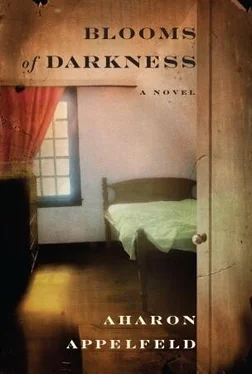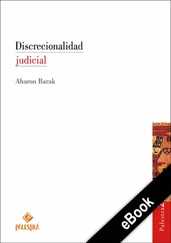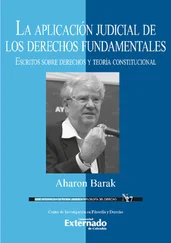Victoria’s repeated threat, that the supplies are steadily dwindling, no longer frightens them. “It’s a good thing you’re not threatening us with hell,” one of the women says.
“I am threatening, but what good will my threats do for stopped ears?”
“Don’t worry. One day we’ll repent.”
“I guess I won’t live to see that.”
“Mom, you mustn’t lose hope.”
“Look who’s talking,” replies Victoria, making a strange motion with her head.
The word “God” isn’t uncommon here. The women often fight over it, and Hugo senses that if a priest or monk were to enter the room, the women would kneel silently in their places and ask forgiveness. “God is everywhere,” he heard one of them explaining at length. “There is no place where He is not present. He is even to be found here, in this garbage dump. We have cut ourselves off from Him, not He from us.”
“You’re wrong. I think about Him all the time,” another answered.
“If you thought about Him all the time, you wouldn’t be here.”
“I’m here because I have no alternative.”
“That’s an excuse. You can use that excuse on us, but not in God’s ear. God knows exactly what’s the truth and what’s a lie.”
Hearing those words, the women fall silent, but not for long. Suddenly one of them bursts into sobs. Hearing her weeping, other women gather around her and say, “Don’t listen to that one. You know her. She looks for faults in everyone except herself.”
Suddenly Madam appears. Since the guard left his post, she has been careful about what she says and doesn’t threaten anyone. She is a handsome woman and could have been the mother of any of the girls here. She speaks in Ukrainian and peppers her words with German. Her appearance stuns Hugo. “How are my girls?” she addresses the seated women.
“We’re unemployed, and our future is in doubt. Maybe you could advise us on what to do? You’re our mother,” says one rather young woman, who has drunk a great deal but isn’t drunk.
“Advise? Me? You know life better than I do.”
“We haven’t had time to think. Three men every night make you dumb.”
“Don’t exaggerate. There were a lot of nights when you slept alone and even got served breakfast in bed.”
“I can’t remember them.”
“I’ve got a list of your free nights.”
“Interesting. My body doesn’t remember them.”
Madam has firm opinions. “A profession is a profession,” she says. “If you chose it, don’t look at it as a punishment, bad luck, or the devil knows what. Every profession has its disadvantages and its little pleasures.” As for the men, she says, “Some are wild beasts who have to be put in their place, but most of them treat women gently.”
“When’s the last time you slept with a man?” one of the women asks impudently.
“I knew men before you were born.” Madam gives as good as she gets.
“Maybe once they were gentle, but not today.”
“People don’t change. What was will always be.”
Madam doesn’t keep it a secret from them that a soft girl or one who’s too picky are not for her. “Even in our profession,” she says, “you can maintain manners and respect. But for that you need backbone.”
Hugo goes back to the closet. I’ve got to write down everything that’s happening to me , he says to himself, so that I’ll always remember what I saw and heard. Mama will read and flinch, and she’ll say, Good God, but Papa will take it in good spirit. Strange and puzzling things always amused him. He’ll say, Our Hugo, we must assume, is no longer the Hugo we knew. He’s matured before his time. Is that a reason to hit him?
The threat hangs over everything and is palpable at every meal. Supplies remain for only two more days; after that, everyone will be on her own. The house will be closed. It’s actually better for it to be closed. The Russians are merciless. Whoever collaborated with the Germans will be hanged in the city square. That threat, which Victoria repeats with a trembling voice, makes no impression on the women, who are immersed in the freedom that has been given to them. “God in heaven,” they say, “who took care of us until now, will keep on taking care of us.”
“That was His care?”
“You mustn’t be ungrateful. We didn’t go hungry, and we didn’t tremble with cold.”
“True, we were just trampled.”
Every word and every sentence receives a response. There are differences of opinion, but there are no bitter quarrels. Hugo sits and observes them: each face has its own expression. The women don’t look gloomy or depressed. They are taking advantage of the respite that was granted to them. It’s common for them to speak in the third person, and in that way they distance themselves a little from their lives.
“I hate myself,” he often hears.
“Go to a convent, and there you’ll be freed of yourself.”
“That isn’t as bad an idea as I used to think.”
“It’s hard for me to imagine you as an ascetic.”
When Hugo is alone in the closet their faces come back to him, and he sees them one by one. Sometimes it seems to him that he has known the women for years, and only now have they removed the veil from their faces.
Suddenly Hugo is sorry that his mother doesn’t understand him, and that he has to conceal these powerful experiences from her. In contrast to her, Uncle Sigmund, drunk and merry, repeats to the family, “Don’t worry about Hugo. He’s getting an excellent lesson. You’re tested on algebra and trigonometry, and you forget it. It’s a good thing he saw life in its nakedness while he was still young. Denials and words that reveal less than they conceal never helped anyone. The time has come to stop deceiving ourselves and our fellows.”
The next day Hugo enters the hall, and what does he see? The women are down on their knees, and facing them, on a chair, is an icon of Jesus. Victoria is standing next to the kneeling women. She is reading, and they are repeating after her, “Good Jesus, forgive us all our sins. Because of our many sins and our pollution, we didn’t see You. You are merciful and full of loving-kindness. Don’t forget your girls and don’t leave them to drown in a slough of sin. Save them with Your grace.”
After a pause, Victoria calls out, “Get up, girls, and stand on your feet. From now on you are joined to our Lord Jesus. Turn away from evil and do good, and don’t forget even for a moment that we are dust and ashes. Only by virtue of the soul, which is part of God above, do we exist. From now on, no more dealings of the flesh, but only the kingdom of heaven.”
Victoria’s face is pale, but fire flares in her eyes. It’s obvious that the words are not hers, and that someone else is speaking from within her. The women understand that there’s no need to comment or disagree, but just to accept the simple meaning of what she said.
Mariana, who didn’t take part in the ceremony, is stunned. What happened in the hall wasn’t like prayer. It was a mighty movement of the soul. Every night they would drink and sing folk songs and church songs. Victoria would admonish them that heavy drinking is a sin, and that they must overcome this temptation, but her efforts are in vain.
Meanwhile, one of the women attacks Kitty. Kitty is stunned, and the woman beats her even harder, screaming, “You aren’t allowed to be here. You don’t belong here. You’re like a thorn in our flesh.” Kitty doesn’t open her mouth, not even when the blood flows down her face.
Some time passes before the women grasp the horror of what has happened, and when they do, the poor girl is lying on the floor unconscious. For a long time they try to revive her. At last Kitty opens her eyes and asks, “What happened?” The terrified women, who are kneeling over her, answer together. “Nothing happened, thank God, nothing.” Everybody sighs in relief.
Читать дальше












